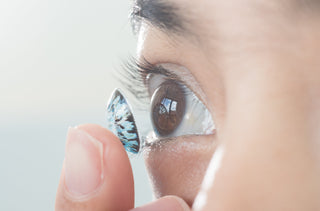Have you planned your child's first eye exam?
Parents know by heart when their baby's vaccinations are due. They visit their pediatrician regularly and have a good idea that baby will make their first dentist visit around the age of three. What about the optometrist? At what age is the first eye exam?
The optometrist is a health professional. They examine the eyes, analyze their function, evaluate vision and treat visual deficiencies. They can also treat eye pathologies such as conjunctivitis or deal with minor emergencies.
According to the "Association des optométristes du Québec," nearly a quarter of children under six have eye or vision problems, but only 15% consult an optometrist annually. Here's why scheduling your child's first eye exam is so important!
The child's eye exam
A child's first eye exam is recommended at six months of age for a premature baby or a low Apgar index if there's a family history of strabismus (squinting eye), amblyopia (lazy eye) or high prescription.
If the child has none of these in their history, they should be examined for the first time at age three, then before the first day of school, and every two years after that.
The optometrist adapts the consultation and the length of the examination to the child's age and attention span. We're all familiar with the letter test. If the child doesn't yet know them, how will they manage? There's no need to worry. At age three, the optometrist presents him with simple drawings such as a hand, a flower and so on. It's only around the age of six that their eye exam will resemble that of an adult.
During the examination
During your child's eye exam, the optometrist will examine:
- Visual acuity
- Binocular vision
- Mobility and stereoscopy (how both eyes work together)
- Refraction (eye power)
- Colour vision
- Eye health
Planning your child's eye exam
As soon as any of these symptoms appear, it's essential to think about scheduling your child's eye exam.
- Constantly rubs eyes
- Is particularly sensitive to light
- Poor concentration
- Poor eye coordination
- Constant redness
To be observed in older children
- Tendency to squint (or rub) while reading
- A tendency to sit too close to the television
- Inability to see at a distance
- Vulnerability to migraines and headaches.
At any age, attention and concentration problems are also signs to be taken seriously when scheduling a child's eye exam. 80% of a child's learning is done through the eyes. That's why it's so important to consult your optometrist.
Click here to book your child's comprehensive eye exam.





















































